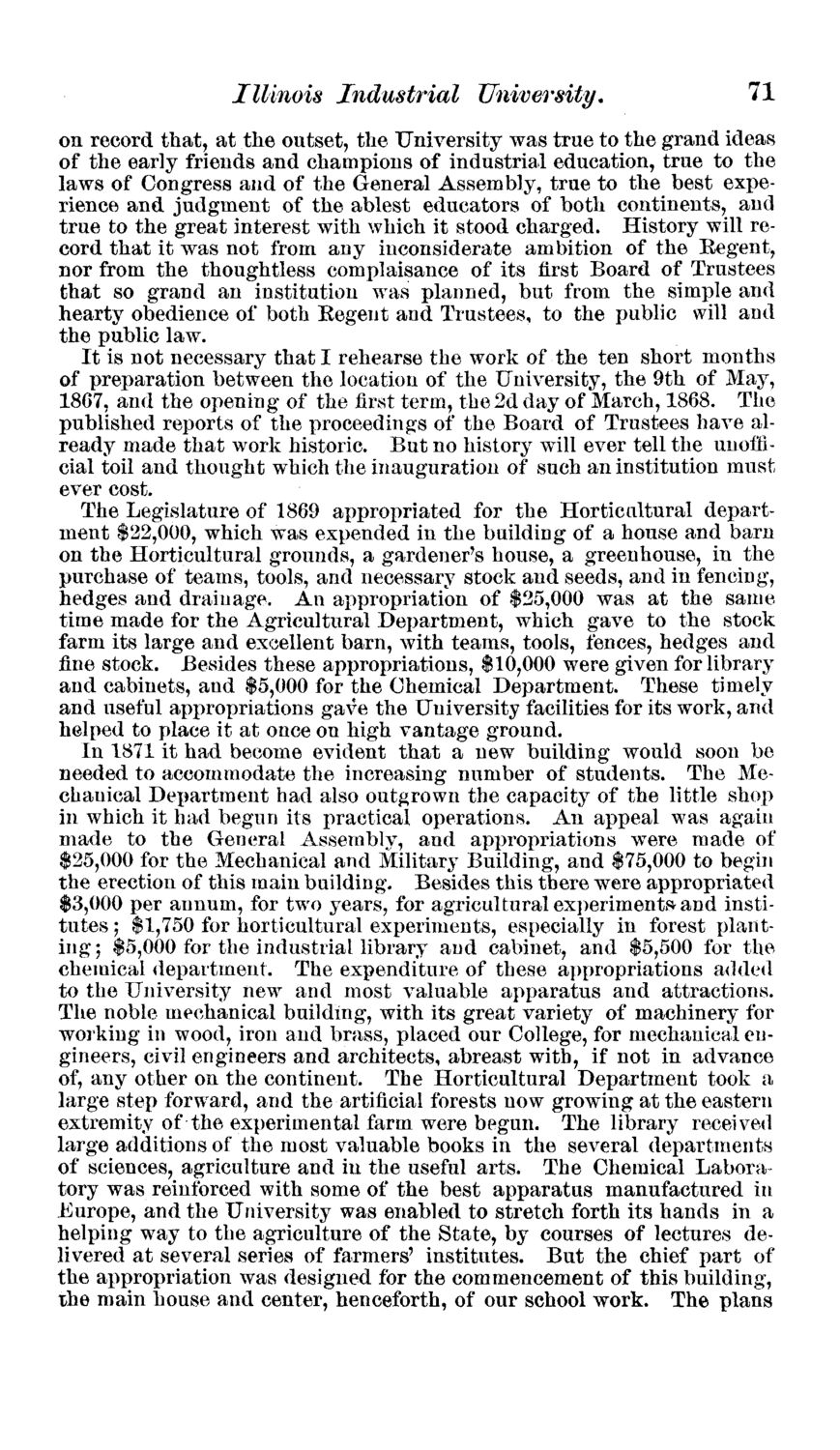| |
| |
Caption: Board of Trustees Minutes - 1874
This is a reduced-resolution page image for fast online browsing.

EXTRACTED TEXT FROM PAGE:
Illinois Industrial University. 71 on record that, at the outset, the University was true to the grand ideas of the early friends and champions of industrial education, true to the laws of Congress and of the General Assembly, true to the best experience and judgment of the ablest educators of both continents, and true to the great interest with which it stood charged. History will record that it was not from any inconsiderate ambition of the Eegent, nor from the thoughtless complaisance of its first Board of Trustees that so grand an institution was planned, but from the simple and hearty obedience of both Eegent and Trustees, to the public will and the public law. It is not necessary that I rehearse the work of the ten short months of preparation between the location of the University, the 9th of May, 1867, and the opening of the first term, the 2d day of March, 1868. The published reports of the proceedings of the Board of Trustees have already made that work historic. But no history will ever tell the unofficial toil and thought which the inauguration of such an institution must ever cost. The Legislature of 1869 appropriated for the Horticultural department $22,000, which was expended in the building of a house and barn on the Horticultural grounds, a gardener's house, a greenhouse, in the purchase of teams, tools, and necessary stock and seeds, and in fencing, hedges and drainage. An appropriation of $25,000 was at the same time made for the Agricultural Department, which gave to the stock farm its large and excellent barn, with teams, tools, fences, hedges and fine stock. Besides these appropriations, $10?000 were given for library and cabinets, and $5,000 for the Chemical Department. These timely and useful appropriations gave the University facilities for its work, and helped to place it at once on high vantage ground. In 1871 it had become evident that a new building would soon be needed to accommodate the increasing number of students. The Mechanical Department had also outgrown the capacity of the little shop in which it had begun its practical operations. An appeal was again made to the General Assembly, and appropriations were made of $25,000 for the Mechanical and Military Building, and $75,000 to begin the erection of this main building. Besides this there were appropriated $3,000 per annum, for two years, for agricultural experiments-and institutes ; $1,750 for horticultural experiments, especially in forest planting; $5,000 for the industrial library and cabinet, and $5,500 for the chemical department. The expenditure of these appropriations added to the University new and most valuable apparatus and attractions. The noble mechanical building, with its great variety of machinery for working in wood, iron and brass, placed our College, for mechanical engineers, civil engineers and architects, abreast with, if not in advance of, any other on the continent. The Horticultural Department took a large step forward, and the artificial forests now growing at the eastern extremity of the experimental farm were begun. The library received large additions of the most valuable books in the several departments of sciences, agriculture and in the useful arts. The Chemical Labora tory was reinforced with some of the best apparatus manufactured in Europe, and the University was enabled to stretch forth its hands in a helping way to the agriculture of the State, by courses of lectures delivered at several series of farmers' institutes. But the chief part of the appropriation was designed for the commencement of this building, the main house and center, henceforth, of our school work. The plans
| |